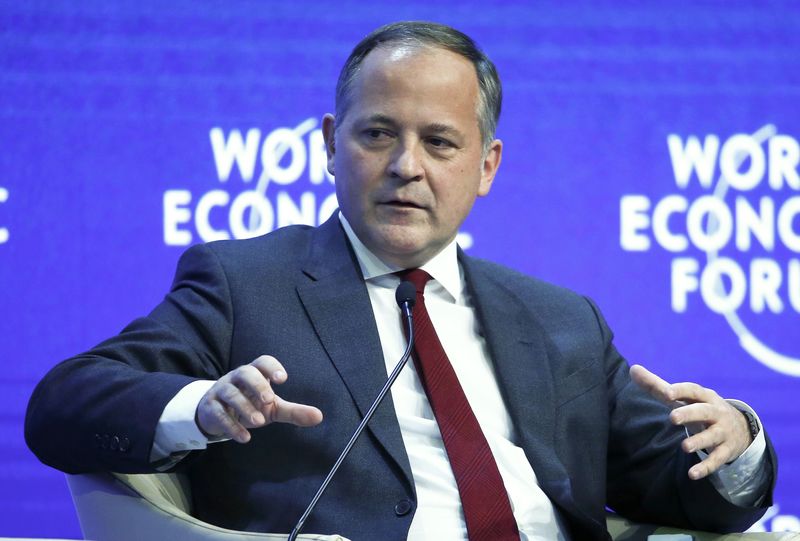By Noah Barkin and Paul Taylor
DAVOS, Switzerland (Reuters) - Central banks have done their best to rescue the world economy by printing money and politicians must now act fast to enact structural reforms and pro-investment policies to boost growth, central bankers said on Saturday.
Two days after the European Central Bank launched a bold bond-buying drive to revive inflation in the euro zone, a top ECB official warned that Europe's common currency project could come unstuck if the bloc limped on with sluggish growth and mass unemployment.
"We can't do everything for Europe, we did our part on Thursday, others have to do their part. There is nothing we can do as the ECB to lift growth in a lasting way," ECB executive board meeting Benoit Coeure said.
Reviewing the global economic outlook at the World Economic Forum in Davos, speakers from the IMF, the ECB, the Bank of England and the Bank of Japan said their ultra-loose monetary policy could only buy limited time for politicians.
The ECB announced on Thursday a massive program of buying government bonds with printed money over 18 months from March in a drive to raise the inflation rate from the current 0.7 percent towards its target of close to but just below 2 percent.
"The political foundation of the European project is being weakened," Coeure said, pointing to low growth and high unemployment.
Separately, ECB President Mario Draghi, who did not attend Davos this year, urged governments to redouble efforts to create a "genuine" economic union.
In an advance text of a contribution for the WirtschaftsWoche magazine, Draghi also said reforms were needed to raise competition, cut bureaucracy and improve labor market flexibility.
Other central bankers in Davos praised the ECB's bold action, which comes after similar measures in the United States, Britain and Japan, designed to revive the economy and avert deflation.
Bank of England governor Mark Carney said there was a greater danger of reckless risk-taking in the financial industry when interest rates were at rock bottom, but regulators were now more aware of the problem and poised to respond.
With doubts abounding as to whether Western economies face long-term stagnation and prolonged ultra-low inflation, Carney sought to reassure British consumers and savers that the BOE had the means and the will to get inflation, currently at just 0.5 percent, back up to 2 percent within a two-year horizon.
Bank of Japan governor Haruhiko Kuroda described the ECB move as "significant" and predicted it would greatly improve the world economic outlook because the euro zone was the biggest economic area on the globe, oustripping the United States.
Kuroda voiced optimism about the developed economies, saying he expected Japan to have 2 percent growth in the 2015 fiscal year and the United States was the fastest growing region of the industrialized world.

However Larry Fink, chief executive of BlackRock, the world's largest money manager, noted that the mood in Davos this year was more pessimistic than in 2014, when the euro zone seemed on track to recover from its deep financial and economic crisis. Since then, a range of geopolitical risks have surfaced and growth in Europe has stalled.